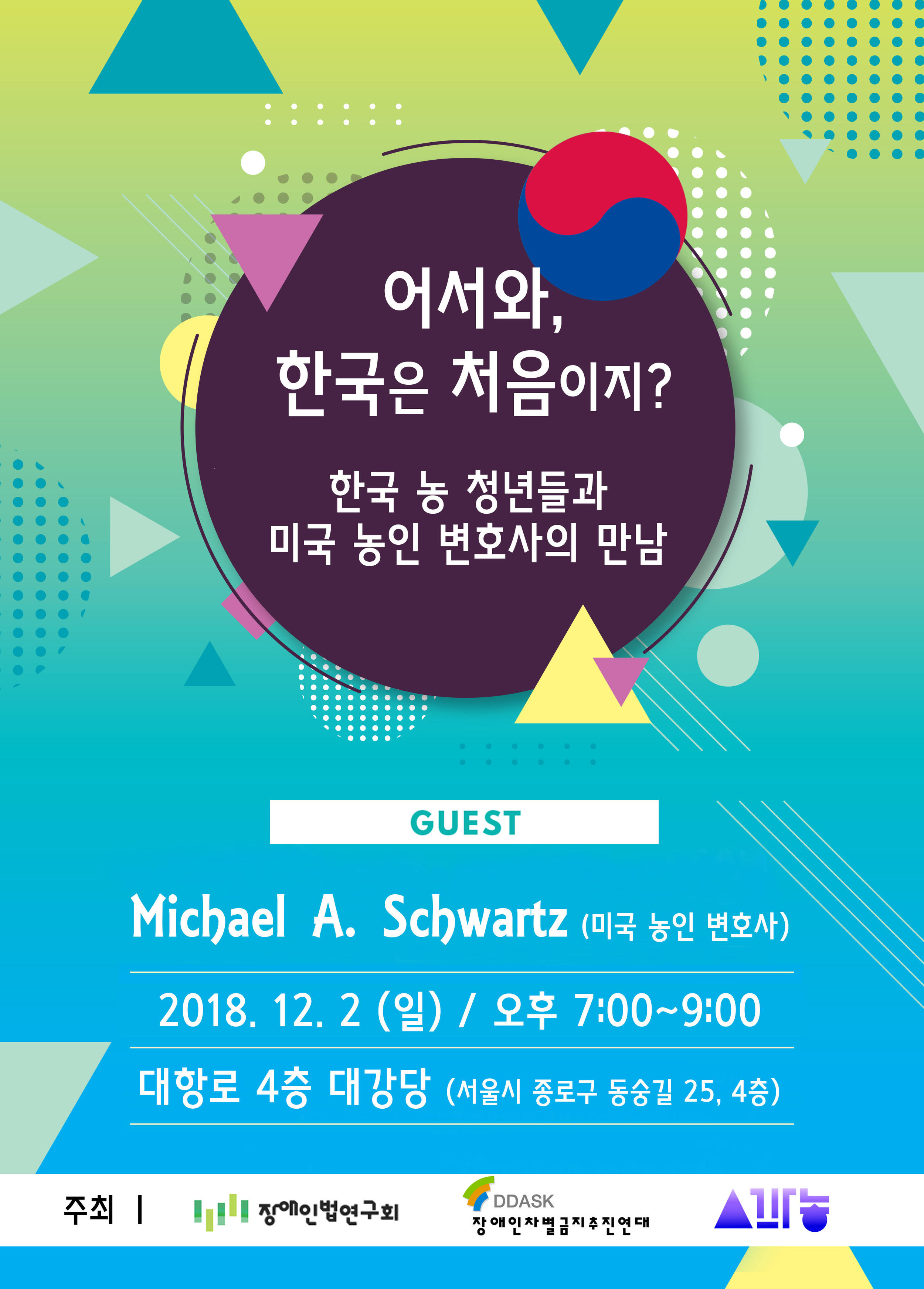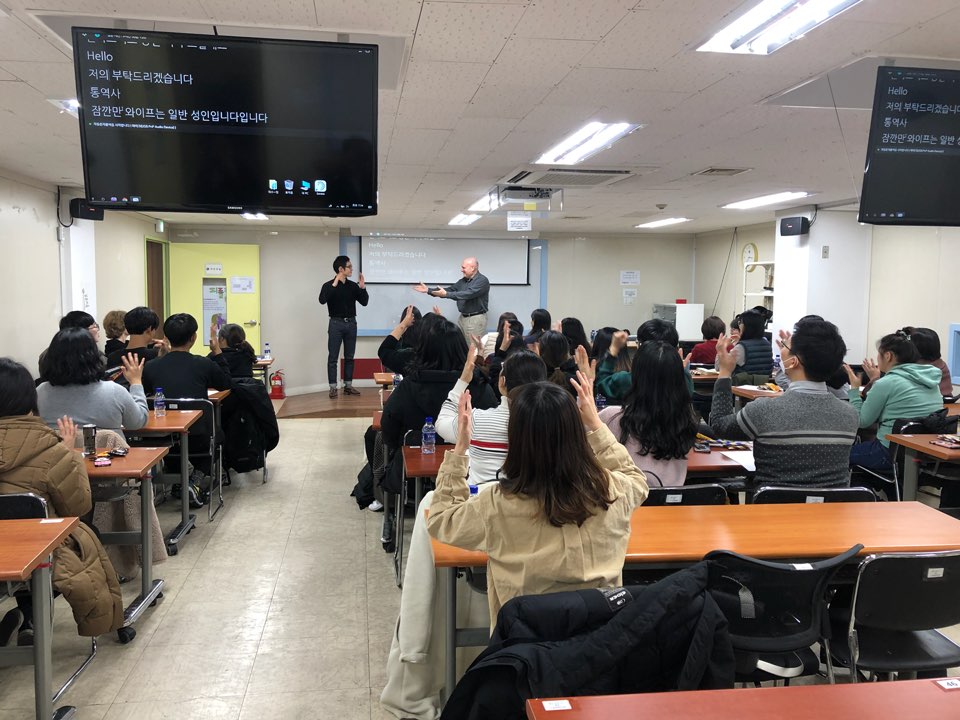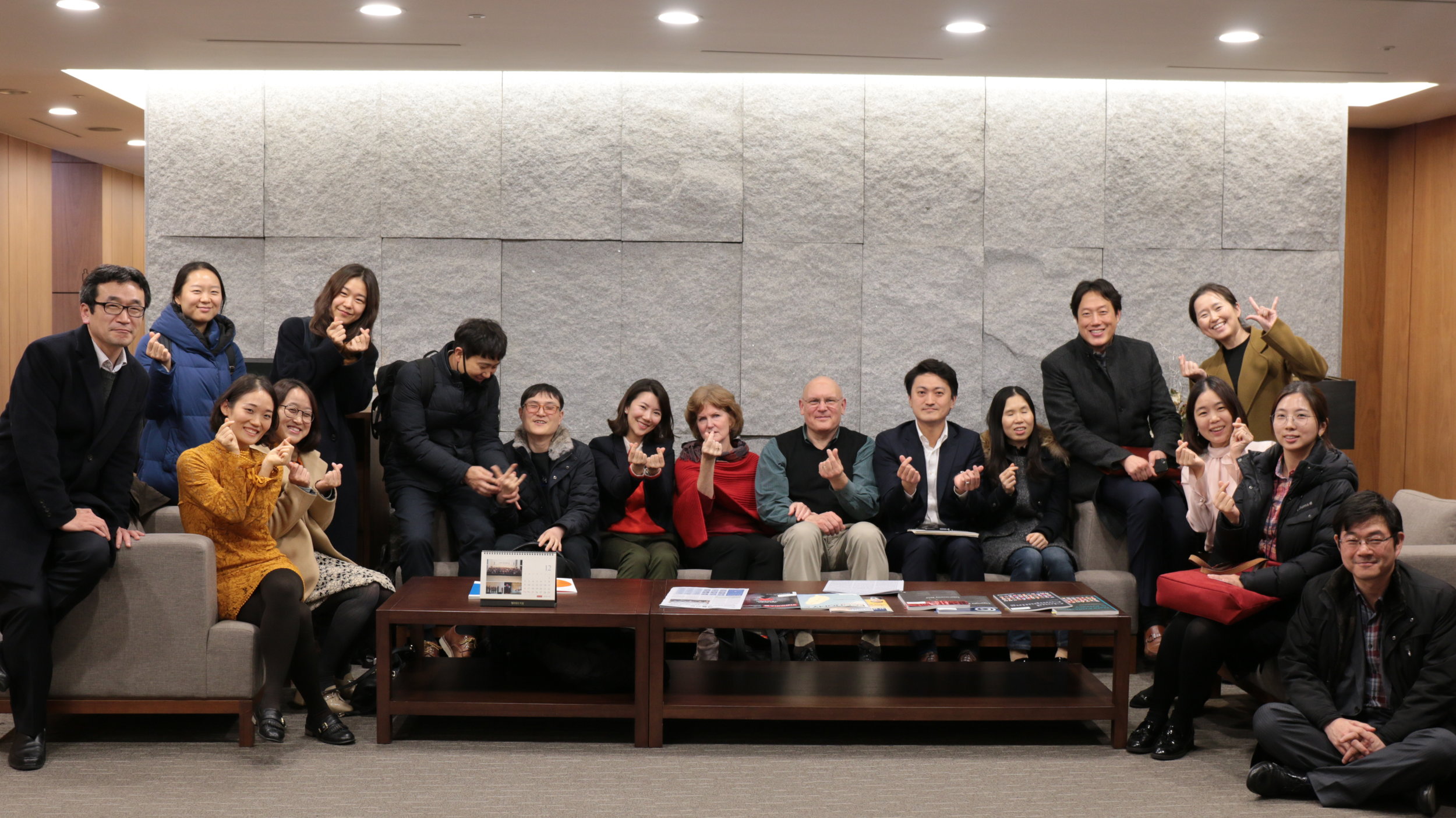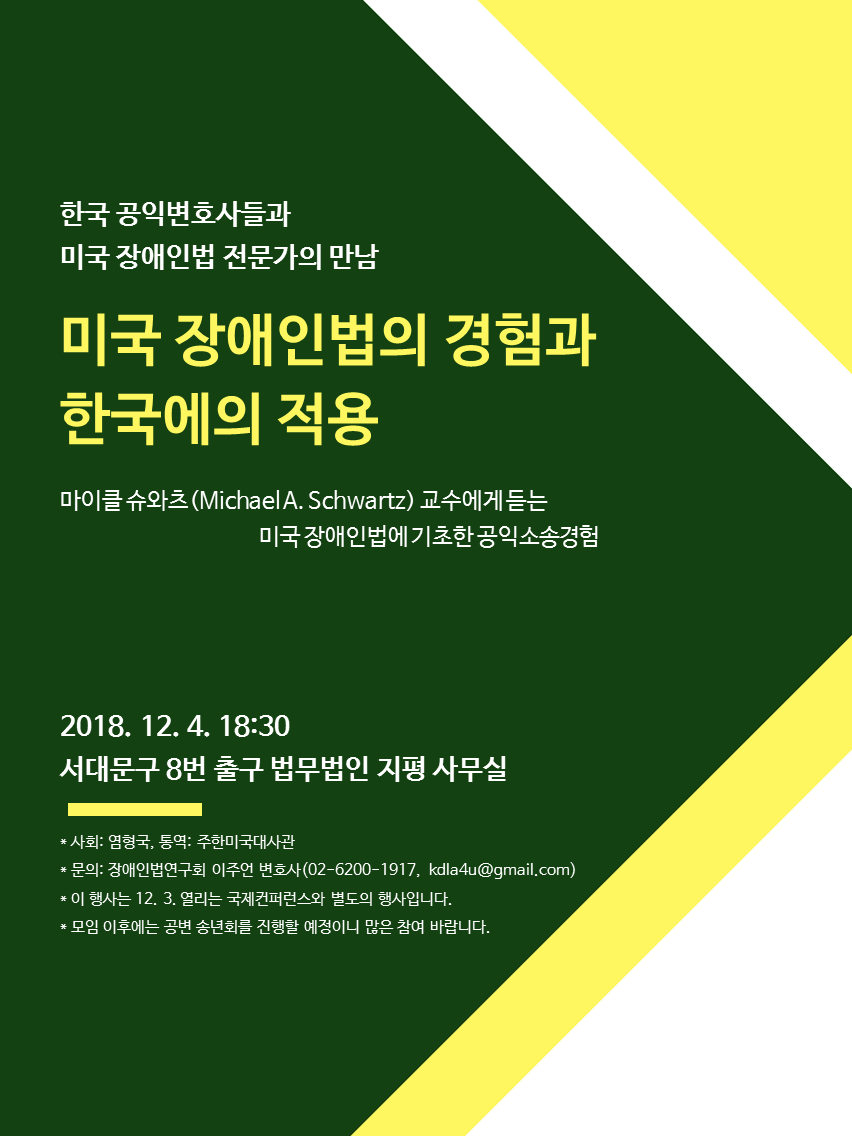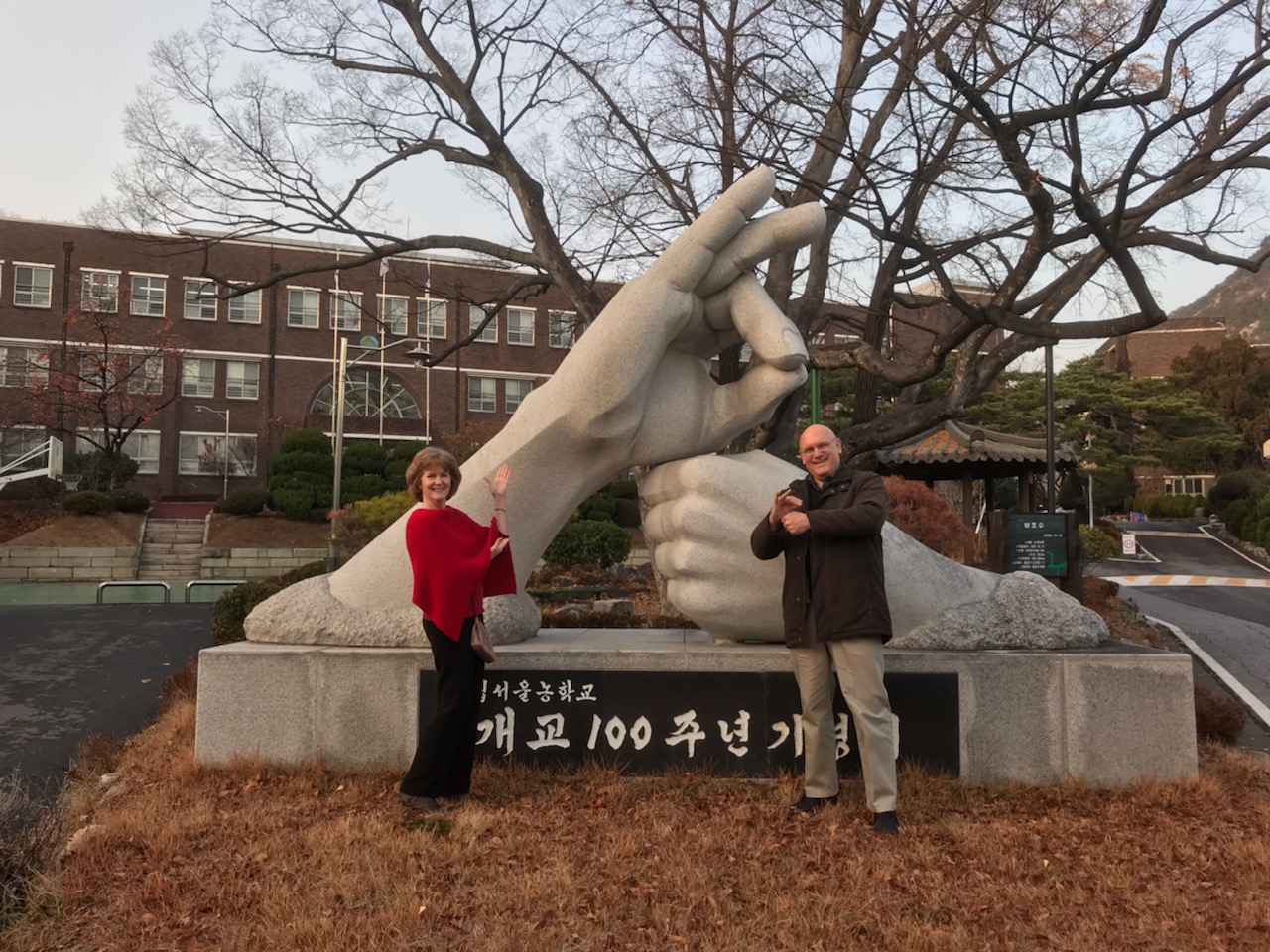Seoul, South Korea
by Michael Schwartz
I was invited to speak at a conference on disability in Seoul, South Korea, that was also a celebration of the Korean translation of “Federal Disability Law in a Nutshell,” written by Ruth Colker (the original edition included the late Adam Milani as co-editor). The conference coincided with International Disability Day, Monday, December 3rd. My wife, Trisha Moloney Schwartz, accompanied me as the trip’s sign language interpreter.
The first photo is of me in a suit, being interviewed by a reporter from a legal publication (hankookilbo.com). The subject was disability law, and I was asked very good questions about the parameters of disability law in the United States. This photo shows me making a point in response to a question.
The second item is a flyer in Korean announcing my appearance at a gathering of young Korean Deaf people interested in engaging in a Q & A with their American visitor. That I was deaf and a lawyer impressed the audience as there are no Deaf Korean lawyers in South Korea. This was Trisha and my first night in Seoul, and jet lag was a challenge. The photo accompanying this flyer shows me on stage with a Korean Deaf man pulling duty as our ASL interpreter (he lived in the United States for several years, becoming fluent in ASL along with his native language, Korean Sign Language). Behind me is a whiteboard, and I put it to use, writing down words and phrases, and the Korean Deaf interpreter translated my scribblings into Korean Sign. It was a challenge to communicate my remarks and responses to questions from the audience, but we adapted and very much enjoyed the conversation. Several students in the audience announced their interest in studying Korean law, a promising sign to keep an eye on.
Next is a flyer in Korean for the Monday, December 3rd, conference in connection with the translation of the Federal Disability Law in a Nutshell, and accompanying it is a photograph of a large group, including Trisha and me, in front of a white background. The conference was interesting. There was a Korean man apparently disabled who unfurled a placard in Korean that had to do with a grievance the man had with someone in the disability community. He marched up and down the aisles with his placard, but no one intervened to stop him. The attitude of the conference organizers was one of patience and kindness, and eventually the man settled down and listened. A group of presenters, including myself, expounded on disability laws, rights and remedies. My presentation was on American injunctive relief as ordered by a court of law in disability discrimination cases. The ADA and other federal anti-discrimination disability laws provide judges with power to grant equitable relief like injunctions compelling the defendant to comply with the law. Although the law in South Korea provides for injunctive relief, Korean judges are inclined not to use this power. Why this is poses a fascinating question for sociological research.
Next is a flyer for a meeting with Korean public advocates in social justice movements in Seoul. I spoke with them about my work as a disability rights advocate armed with the power to litigate for reform, and we had a Q & A where we exchanged views on why injunctive relief was difficult to obtain in South Korean courts. My suggestion that we host a conference for American and Korean judges on the issue of injunctive relief was well received. The accompanying photo shows us sitting on a couch.
The last item is a photograph of Trisha and me standing in front of a large sculpture of two hands spelling a word in Korean. This is at the front entrance of the Seoul National School for the Deaf. We met the principal of the school and his staff in the principal’s office and exchanged business cards. We learned that the school was an old institution, and that Helen Keller paid a visit in 1937. There was a mini-museum with exhibits going way back in time, very well organized by a Deaf teacher on the school’s staff who painstakingly put together an exhibit that highlighted the school’s accomplishments over the years. Trisha and I had an opportunity to speak with seven Deaf students at the school, and we answered their questions and asked them questions. It was an enjoyable conversation.
Not pictured is my meeting with a group of Korean judges where we had a conversation about injunctive relief. I asked why Korean courts were hesitant about ordering defendants to comply with the terms of an injunction remedying discrimination based on disability. I never got a clear answer so I can’t state what they think about injunctive relief, but I surmise it has something to do with Korean cultural norms regulating human behavior. American law has a long tradition of injunctive relief as a remedy for discrimination based on race, gender and disability, and an injunction is accepted practice when a case has been made for it.
One aspect of my visit that caught my attention was the process of translating my sign language to Korean spoken language. It was a three-step process, starting with my signs. Trisha voiced what I was signing, but because it was consecutive, not concurrent, interpretation, Trisha and I had to pause after I said a sentence or two so that the Korean interpreter could translate my words into spoken Korean. I would speak, pause, and wait for Trisha to complete my piece. As she was speaking, the Korean interpreter was jotting down notes that looked like Korean shorthand. When Trisha finished, the Korean interpreter spoke for what seemed far more than what I had said in English. Although it was a cumbersome process, it worked well.
The issue of injunctive relief is a burning one for disability rights advocates in South Korea who recognize the value of court orders that have the capacity to redress and stop discrimination.
Korean food is delicious. There are a number of “chicken and beer” restaurants where beer is served along with heaping plates of fried chicken. Trisha and I thought we’d eat chicken cooked and served in beer, but no, it’s chicken AND beer.
One of the highlights of the trip was meeting representatives of the Korea Association of the Deaf, including Lee Daesub, president, and Jeon “Sooney” Soohoon, director. Sooney had lived in the United States for 27 years and was fluent in ASL. He served as interpreter for Lee who did not know ASL (and I don’t know KSL). Lee and Sooney graciously took Trisha and me out to dinner at a traditional Korean restaurant. We had a good time.
Meeting Juwon Chung, a Deaf Korean pastor, and his lovely wife was a treat. They took us to the top of the Seoul Tower with its breathtaking panoramic views of the capital. It was night time, and Seoul lay before us in glittering beauty. We then adjourned to a restaurant for more chicken and beer.
Finally, but not least was our visit to the DMZ. From an observatory we peered into North Korea. It was surreal – the villages across the border were fake, an attempt to convince the world that all of North Korea was clean, comfortable, safe and habitable.


